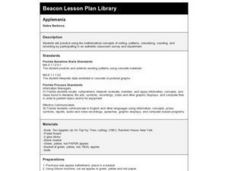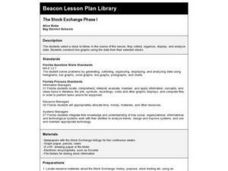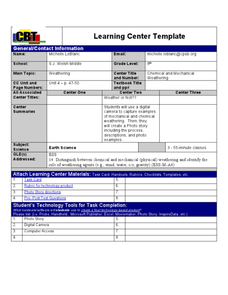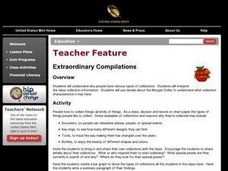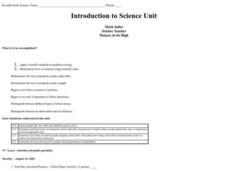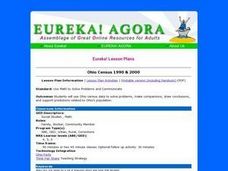Curated OER
Applemania
First graders read "Ten Apples Up On Top!" and view real apples in a basket. They taste different kinds of apples and describe the tastes: sour, sweet, etc. They graph everyone's favorite apple. They interpret the graph and draw their...
Curated OER
Ferris Wheel Problem
Students use two pairs of parametric equations to describe two objects in motion. They determine when two objects are the closest. They simulate the behavior of the two objects and interpret the behavior of the objects in motion.
Curated OER
Frequency vs. Size
Students identify and interpret sound as a vibration and what period and frequency are. They also divide the various types of objects so that all objects are explored and the procedures are determined by the students.
Finally, students...
Curated OER
Surface Meteorological Observation System (SMOS)
Students monitor local surface weather conditions for at least 30 days. They interpret the data by graphing it and detemining percentages.
Curated OER
Home on the Biome
Fifth graders study six major biomes, graph temperature and rainfall, and present their findings to the class.
Curated OER
The Stock Exchange Phase I
Second graders select a stock and follow its ups and downs, using graphs to show its success.
Curated OER
Sunspots and Climate
Students make a graph that shows how the number of sunspots has changed over the past 30 years and discover how there is a pattern in sunspot number. They find a disruption in this pattern due to the Little Ice Age.
Curated OER
Weather... Or Not
Learners observe and discuss the local weather patterns, researching cloud types and weather patterns for cities on the same latitude on the Internet. They record the data for 6-8 weeks on a graph, and make weather predictions for their...
Curated OER
Pumped Up Gas Prices
Young scholars spend one month keeping track of the mileage and gasoline amounts they or their family has used. Information is entered into a spreadsheet to help calculate the average gas prices over time.
Curated OER
Weather for Health
Ninth graders encounter various types of numerical information (represented in multiple ways), much of which is abstract and difficult to comprehend. In this instructional activity, 9th graders will convert given information into bar...
Curated OER
Effects of The Great Depression
Seventh graders discuss the unemployment trends of the 1920s-1930's. They look at it faces of the citizens that lived in the time period. Students work with visual clues to investigate about the living conditions during the Great...
Curated OER
Using Statistics to Uncover More Evidence
Fifth graders participate in an online Web lesson plan on ways of interpreting data. They conduct a survey and interpret the results in a journal entry.
Curated OER
Extraordinary Compilations
Young scholars discuss and record why people have various types of collections. They interpret the class collection of information then use details about the Morgan Dollar to understand what collection characteristics it may have.
Curated OER
Introduction to Science
Seventh graders investigate scientific methods to solve problems. They demonstrate creating data tables and graphs. They study the role of a scientist and the importance of safety in a science lab. They distinguish between an...
Curated OER
Responding to Alcohol: What's Important?
High schoolers examine the effects on motor functions in mice. They make observations and graph their data. They analyze the data and draw conclusions in each of the three experiments.
Curated OER
Using SWMP Data
Students are introduced to the SWMP system which tracks short-and long-term changes in water. Using this data, they plot and interpret the data on a graph to determine how human activities are lowering the water quality. They also...
Curated OER
Pacific Atolls and Island Groups
Students construct, interpret and translate maps and geographic data. Given a worksheet, students identify an island, an atoll, a scale, and a compass rose. Students grid systems, legends, and symbols. They use the map to find answers to...
Curated OER
Hibernating Hoopla
Students simulate hibernation with their stuffed animals. They predict the length of time of hibernation and type their math journal entries about sorting, graphing and draw pictures. They read bear hibernation stories.
Curated OER
What is a Cloud
Third graders study clouds and how they are formed. They write acrostic poems about clouds and analyze and graph temperature data collected during varying degrees of cloud cover.
Curated OER
Social Studies: Canadian City Comparison
Young scholars research Canadian population distribution while comparing and contrasting the quality of life in two cities. They discuss issues and problems that cities and rural towns face. Students apply various methods, such as...
Curated OER
Algebra I: A Draining Swimming Pool
Learners analyze and develop symbolic representations to describe the amount of water left in a pool being pumped out after a given amount of time, with various pumping rates and initial quantities of water in the pool.
Curated OER
Sea Surface Temperature Trends of the Gulf Stream
Students explore the importance of the Gulf Stream. Using a NASA satellite images, they examine the sea surface temperature. Students collect the temperature at various locations and times. Using spreadsheet technology, they graph the...
Curated OER
Keypals and You
Students collect and compare data received from keypals. They use electronic mail to exchange information with keypals and rrite a paper comparing similarities and differences between themselves and their keypals. In addition, use a...
Curated OER
Ohio Census 1990 & 2000
Pupils use Ohio census data to solve problems, make comparisons, draw conclusions, and support predictions related to Ohio's population. They interpret and work with pictures, numbers and symbolic information.
